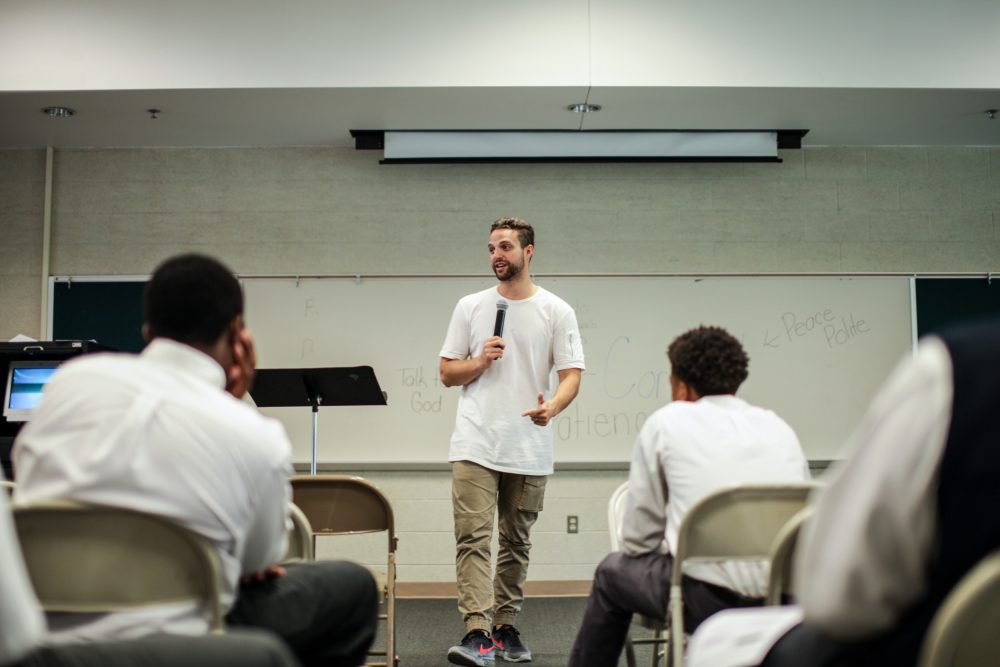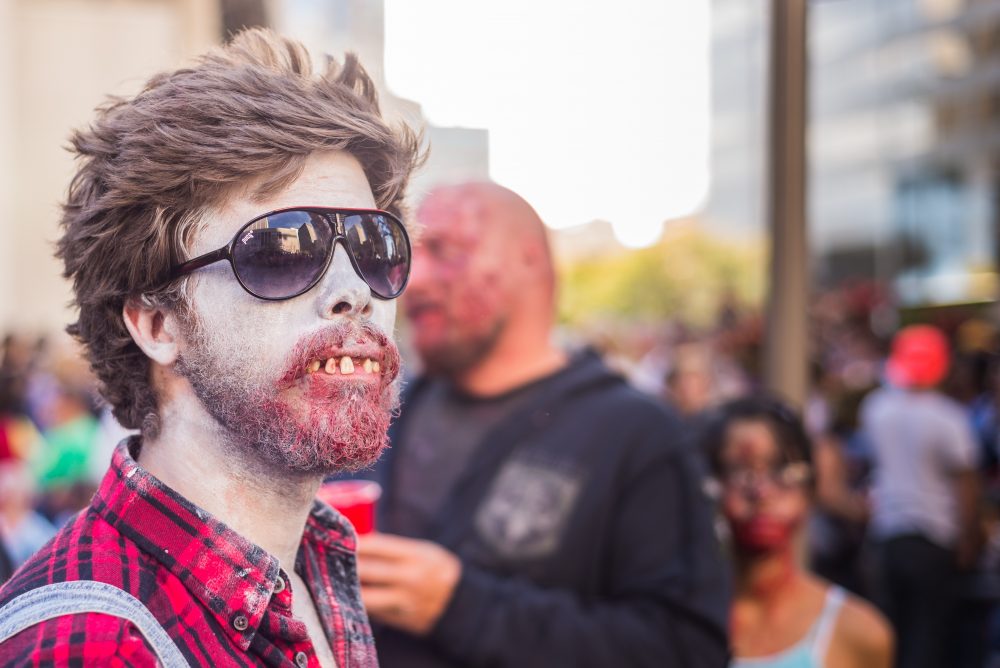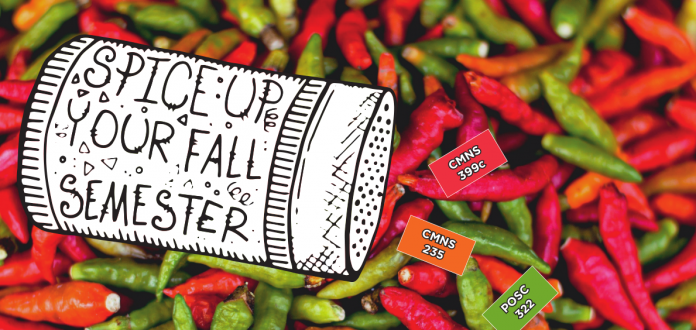It will also feature classes that might not be offered regularly, but that you should keep an eye out for during your time here. Perhaps a bit of positive reinforcement can convince the university departments to take a chance on the more uncommon courses more often.
Your education will always mean more than just the grades you achieve and course plans you follow; I’d highly suggest many of these as electives as I think they either offer valuable experience and knowledge or are interesting and rare enough to give a chance.
Look out for
ENGL 170: Literature in Context – Understanding Comics / ENGL 270H: Graphic Novels
Prerequisites: None.

Do you love comics / graphic novels? Need to take an English course as a requirement for a program and not sure what to take? You should consider checking out ENGL 170: Understanding Comics!
The course was proposed by Professor Ron Sweeney and first taught in Fall 2015, after which it received so much positive feedback that it has been offered twice since, and a subsequent second-year course, ENGL 270H: Graphic Novels was also offered for the first time this Winter 2017.
For far too long, the medium has been relegated to a category below “real” literature, but comics are capable of being just as deep and complex as any book, and at the same time as beautiful and inspiring as a painting or other fine work of art. ENGL 170 is a great introduction into the world of comics, their history, and place in the literary arts, as well as a look into just how deep and diverse this wonderful genre truly is. ENGL 270H continues a further examination of the graphic novel, and does not require you to have taken ENGL 170 prior, though it’s recommended. Both courses include a wonderful syllabus of different work, from superhero stories to autobiographical “tragicomics.” Interpreting everything from text and characters to the hidden meaning in different panel styles and usage of colour, you might just find yourself looking at comics in a whole new way. Regardless of if you’re a seasoned reader or just getting into it, these classes are a fun way to earn some credits while also discovering some amazing work and sharing your passion for the subject with others.
-Kat
Offered in the fall
CMNS 235: Oral Communication (Public Speaking)
Prerequisites: None

Literally every student, from hopeful lab techs, anthropologists, lawyers, cooks, and tradesmen — all stand to benefit in a meaningful way by developing their public speaking skills. I went into this class having to hold back shakes and vomit when talking in front of people, and came out at the end of the semester much more comfortable and cognizant with my communication. The assignments themselves are straightforward and simple (some busy work week-to-week in peer evaluations; I did my presentations themselves on topics from “How to make nachos” to “Why Bruce Wayne hates poor people”) but they will challenge you to step outside of your comfort zone.
An added benefit, not only will you make new friends (you actually learn about each other and talk) but if you take two other lower level communication courses (nine credits total) you can walk away with a Professional Communications Essentials Certificate.
-Panku
Offered in the fall
ENGL 104: Introduction to Creative Writing – Fiction, Poetry and Drama
Prerequisite(s): None

If you’ve been feeling locked up inside your head, struggling to really express feelings and ideas the way they sound in your thoughts, maybe this introductory creative writing course can help oil the gears a touch. You’ll be learning the most essential literary techniques and terminology, as well as getting closer to the heartbeat at the core of creative writing. Hone your skills writing fiction, poetry, and drama both in and out of class, and learn through in-class dialogues how to properly analyze and constructively critique fellow peers’ work in a discussion setting.
Recommended for those who would like to begin exploring their capability in expressing themselves through writing and start to get a more solid handle on contemporary and classical literary structure and language.
-Caleb
Look out for
CMNS 399c: Election Campaign Management
Prerequisites: 60 credits, changed depending on special topic

Also, a general recommendation for Sam Schechter, if this course is ever offered on a timetable again he’ll most likely being the one teaching it. Coinciding with the leadup to a provincial election, this course provided a unique opportunity to not only learn from someone with on-the-ground experience in the subject matter but also with the connections to bring in speakers such as NDP provincial director Raj Sihota and former B.C. Green party leader Stuart Parker.
The coursework was fun and challenging, and he’s about as fair of a marker as I’ve ever encountered. The class time itself either filled with interesting and substantial discussion or imaginative workshops. (A highlight was an election day mock up where we organized volunteers and mapped out a district plan as a group.) However, compared to my other recommendations, I’d say this one might require some interest in the subject to begin with — it’s about the mechanics of politics and not the ideology of governance.
-Panku
Look out for
MACS 299D: Zombies on the Brain: Popular Culture & the Living Dead
Prerequisites: None. MACS 110 or MACS 130 recommended

There are few courses as easy to pitch as MACS 299D. It’s about zombies, which is a good start on its own, and (almost) every week you’ll watch a movie in class. The readings are all PDFs, too, so you won’t have to buy a textbook. But beyond those straightforward selling points, it’s a fascinating class, and Darren Blakeborough really uses the limited time left after the films to provide a comprehensive understanding of the history of zombies in culture and media, and their role as stand-ins for social anxieties of the era. While the prerequisites say MACS 110 or 130 is recommended, MACS 299D is honestly a great introduction to a wide range of sociology concepts, and could easily foster an interest in media and communications studies as a whole through the accessible gateway topic of zombies. Add to that the fact that every class is entertaining and engaging from beginning to end with fun movies and conversational, relaxed, but also incredibly informative lectures, and MACS 299D is an easy recommendation for anyone who wants to understand the zombie phenomenon, or just have a class they look forward to every week.
-Jeff
Offered in the fall
POSC 332: The Politics of Multiculturalism
Prerequisites: 45 university-level credits

An exceptional course with Dr. Fiona MacDonald that will reframe your thinking of the tensions around multicultural accommodation, commonality, and the politics that surround them. In particular, this course will enable you to critically evaluate matters concerning power, recognition, and citizenship, which can be applied to a host of contemporary social issues both at the national and international level. If you are even vaguely interested in subjects such as social justice issues, human rights, Indigenous self-governance, and the Sharia law debate, this course is for you! It’s taught in a seminar style which is more interactive (student-led class discussions are the norm) which is really interactive active and engaging.
-Jessica
Look out for
POSC 322: Introduction to American Politics
Prerequisites: POSC 230 or 45 university-level credits

You’ll probably only see this during election seasons (Fall 2020), but when you do you should jump at the chance. Even if you’re not taking Political Science as a major (but this should be a requirement if you are) this course is not only fun and engaging in its structure (breakout groups and independent in-class research for issues like gun control) but also provides a great primer to better understand American culture and its politics. You’ll find yourself comparing and learning more about ours as well.
I’d like to give a special shoutout to Professor Michelle Rhodes who taught this class when it was offered in 2016. She was incredibly knowledge, passionate, and led the class in a way that encouraged engagement that I haven’t seen in similar courses. Quite a few professors at UFV could learn a thing or two by just sitting through one of those classes. My only regret was not nominating her for a teaching award in time.
-Panku
Offered in the fall
MACS 201: Music and Society I
Prerequisites: None. MUSC 100, MACS 110, or MACS 130 recommended

Nothing can enhance a course quite like a professor who’s passionate about the subject, and Eric Spalding’s MACS 201 class is a prime example of that. The course covers a wide range of topics about the music industry, fandom, and its place in our culture, but the heart of the course is Spalding’s love of music: of sharing his favourite songs or artists (and sometimes those he finds hilariously bad), to talking about the differing tastes of his students, this is a course anyone who appreciates music can enjoy. The structure also makes it quite relaxed: there are three exams, but each only tests on material since the previous one, cutting the course up into three distinct parts and making studying much less stressful. If you love music, or are interested in the industry, come into this course with an open mind, ready to hear some new artists and talk about differing tastes, and you’ll have a great time. Plus, how many other professors play you their own original music?
-Jeff


